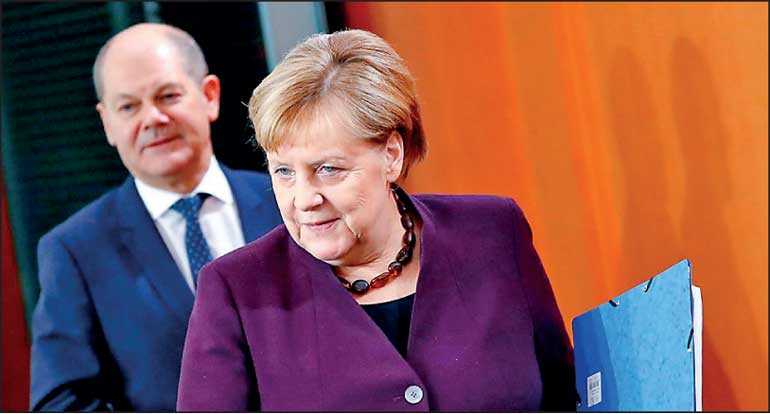Saturday Feb 21, 2026
Saturday Feb 21, 2026
Friday, 22 November 2019 00:05 - - {{hitsCtrl.values.hits}}

German Chancellor Angela Merkel and Vice Chancellor and Finance Minister Olaf Scholz attend the weekly cabinet meeting in Berlin, Germany, November 13, 2019 - Reuters
BERLIN (Reuters): Chancellor Angela Merkel and Finance Minister Olaf Scholz on Monday brushed aside a rare joint demand from German businesses and unions that they “wake up” the stagnant economy by ditching the balanced budget policy and funding infrastructure with debt.
The call by the BDI, Germany’s most influential business lobby group, and the DGB umbrella union shows how much public debate has shifted in a country long obsessed with its “black zero” policy of no net new borrowing.
With the economy barely growing and Berlin’s borrowing costs at record lows, Merkel and Scholz are facing growing pressure at home and abroad to drop their self-imposed balanced budget pledge, which limits the fiscal room to hike public spending.
BDI President Dieter Kempf and DGB head Reiner Hoffmann said in their joint statement that Berlin should not only bury the budget policy, but also consider changes to the constitutionally enshrined debt brake.
“Germany must wake up from its sleeping phase,” Kempf told reporters in Berlin.
“This is not primarily about fighting symptoms of a recession, but rather tackling the more deeply rooted causes of weak growth,” Kempf said.
The government had a duty to improve Germany as a business location and secure long-term prosperity, he said.
But Merkel and Scholz both insisted during a news conference following the weekly cabinet meeting that the government had already increased public investment to record levels so there was no need to question the debt ban as a guiding principle.
“With this budget policy, we can also generate growth,” Merkel said after data showed last week that Europe’s largest economy grew a meager 0.1% in the third quarter and even shrank by 0.2% in the previous three months.
Scholz said he viewed the comments by the BDI and DGB as supporting the government’s expansionary fiscal policy.
Kempf said Berlin should increase public investment in digital and transportation infrastructure by half a percentage point of economic output, roughly 17 billion euros. This would be on top of the 43 billion euros earmarked in the federal budget for public investments in 2020.
“We can no longer afford to put the prosperity of future generations at risk with such an outdated infrastructure and underfunded education system,” DGB head Hoffmann added, saying that more public investment would also strengthen social cohesion and promote equal living conditions across the country.
Germany’s state-owned development bank KfW has estimated that municipalities across the country have unmet public investment needs of about 138 billion euros.
Boosting German investment would also be positive for the broader euro zone. The new president of the European Central Bank, Christine Lagarde, has singled out Germany as a country that could deploy its budget surpluses to help growth in the bloc.
Germany’s debt brake allows a federal budget deficit of up to 0.35% of gross domestic product, giving Berlin only limited scope to increase new debt.
Officials are considering the creation of independent public investment agencies which could take on debt without falling foul of the strict national spending rules, three people familiar with the matter told Reuters in September.